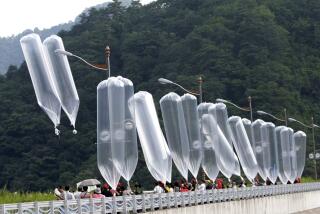China Test Seen as Impetus for N. Korea Missile Launch
- Share via
TOKYO — China’s launch this week of a new long-range missile could sharply complicate efforts to keep North Korea from following suit, analysts here say.
“It’s really bad timing,” said Ichita Yamamoto, a parliament member in Japan’s upper house and a member of the ruling Liberal Democratic Party. “I’m sure it will give an excuse to North Korea that this is [justified by] national sovereignty.”
Yamamoto said Tuesday that the best way to discourage adventurism by North Korea may be to threaten its access to Japanese technology and the estimated $600 million in cash remittances the country receives each year from Japan.
On Monday, China launched what experts believe is the Dongfeng-31 missile, capable of delivering a single nuclear warhead about 5,000 miles.
Analysts fear that North Korea could respond within the next few weeks by testing its Taepodong 2 missile--a powerful new rocket with a range of 4,000 miles that would put Alaska or Hawaii within its reach.
The North added to those concerns Tuesday when its official Korean Central News Agency quoted an unidentified spokesman as acknowledging for the first time preparations for such a test.
“Whether we test-fire a satellite or a missile is a legitimate, independent right to be exercised by a sovereign state,” the spokesman said.
Osamu Yatabe, secretary-general of Japan’s New Socialist Party, who just returned from the North Korean capital, Pyongyang, said his meetings with officials there convinced him that no launch is imminent.
“Japan makes too much noise,” he said.
A Western diplomat based in Tokyo said that, most likely, Beijing wasn’t thinking much about North Korea when it surprised the world with its announcement of the launch but was instead more concerned with keeping its own military buildup on schedule. Beijing’s desire to shake up Washington for supporting Taiwan also may have played a part.
But China’s action could seriously complicate recent stepped-up efforts by Washington, Seoul and Tokyo to contain North Korean leader Kim Jong Il’s military regime, the diplomat said.
The U.S., which has proposed easing economic sanctions against North Korea if Pyongyang stands down, has threatened to use “all available means” if the regime goes ahead with a Taepodong 2 test.
Yamamoto and fellow upper house member Keichiro Asao told reporters Tuesday that they would like to pass legislation allowing Tokyo to cut off resources to the isolated Stalinist state if it doesn’t behave. This would be done by substantially tightening Japan’s laws controlling foreign exchange and foreign trade--steps Washington says it strongly supports.
Yamamoto and Asao maintain that much of the navigation equipment and semiconductors in North Korean missiles and submarines come from Japan. More than 20% of the equipment found in a North Korean submarine caught off South Korea earlier this year was from Japan, Yamamoto says. Those components included a global positioning satellite system made by Furuno Electric Co. and a periscope imaging system made by Canon Inc.
In addition, about 600,000 Japanese residents of Korean descent, many of whom work in Japan’s lucrative pinball industry, send or bring over an estimated $600 million annually to North Korea.
A Furuno official said his company’s technology is not sensitive, violates no export control laws and can be bought without a license at special shops in Akihabara, the Tokyo district that is Japan’s electronics mecca.
“We have no direct contact with the North Korean market,” he added. “Therefore, it is impossible to do business with North Korea directly.”
The Furuno official added that North Korea also buys used Japanese ships, whose radar systems and other technology may be stripped for use on military vessels.
Canon officials were unavailable for comment.
Yamamoto said the trouble with Japan’s current export controls is that, in effect, they prevent Tokyo from imposing any restrictions for reasons of national security. Japan can cut off trade and funds only for financial reasons or under cover of a United Nations, Group of 7 or other multilateral resolution, he said, even if the same commerce creates weapons that threaten Japan’s people.
According to the government, Japan had $175 million in exports to North Korea in 1998, down 3.3% from 1997. Of the total, machinery accounted for 38%, textiles for 23.5%, ships and other transport items for 19%, and food for 4.5%.
A Trade Ministry official, requesting anonymity, said Japan prohibits the export of aviation equipment, machine tools and missile parts without a permit. Since North Korea launched its Taepodong 1 missile nearly a year ago, he added, Japan has suspended all charter flights to North Korea and all official food aid.
Katsumi Sato, director of the Modern Korea Institute think tank in Tokyo, said he believes that 70% of the components put together by Pyongyang’s “Unit 99” missile development team are made in Japan.
Sato outlined several routes commonly used to smuggle sensitive goods from Japan to Pyongyang. Individuals fly from Tokyo’s Narita airport to Beijing, Hong Kong or Macao, where they pass technology off to North Koreans, he said.
Alternatively, many Japanese residents with North Korean relatives take a ferry service from Japan’s Niigata prefecture to North Korea. Finally, many Japanese high-tech companies have joint ventures with Chinese partners that acquire goods and then sell them to North Korean trading companies.
“All major Japanese electronics companies except Toshiba are making missile devices,” Sato claimed. “They know where their products are going; they know what the devices are used for.”
Officials say Toshiba has remained squeaky-clean after it was caught in the 1980s selling eight sophisticated milling machines to the Soviet Union. Washington said these allowed the Soviets to make much quieter submarines.
*
Etsuko Kawase of The Times’ Tokyo Bureau contributed to this report.
More to Read
Sign up for Essential California
The most important California stories and recommendations in your inbox every morning.
You may occasionally receive promotional content from the Los Angeles Times.










